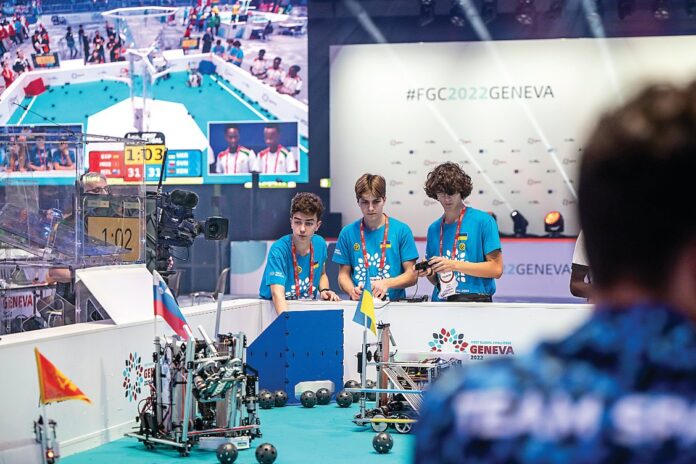GENEVA: For their first trip to a celebrated robotics contest for high school students from scores of countries, a team of Ukrainian teens had a problem.
With shipments of goods to Ukraine uncertain, and Ukrainian customs officers careful about incoming merchandise, the group only received a base kit of gadgetry on the day they were set to leave for the event in Geneva.
That set off a mad scramble to assemble their robot for the latest edition of the “First Global” contest, a three-day affair that opened on Friday, in-person for the first time since the pandemic. Nearly all the 180-odd teams, from countries across the world, had had months to prepare their robots.
“We couldn’t back down because we were really determined to compete here and to give our country a good result — because it really needs it right now,” said Danylo Gladkyi, a member of Ukraine’s team. He and his teammates are too young to be eligible for Ukraine’s national call-up of all men over 18 to take part in the war effort.
Gladkyi said an international package delivery company wasn’t delivering into Ukraine, and reliance on a smaller private company to ship the kit from Poland into Ukraine got tangled up with customs officials. That logjam got cleared last Sunday, forcing the team to dash to get their robot ready with adaptations they had planned — only days before the contest began.
The event, launched in 2017 with backing from American innovator Dean Kamen, encourages young people from all corners of the globe to put their technical smarts and mechanical knowhow to challenges that represent symbolic solutions to global problems.
This year’s theme is carbon capture, a nascent technology in which excess heat-trapping CO2 in the atmosphere is sucked out of the skies and sequestered, often underground, to help fight global warming.
Teams use game controllers like those attached to consoles in millions of households worldwide to direct their self-designed robots to zip around pits, or “fields,” to scoop up hollow plastic balls with holes in them that symbolically represent carbon.
Each round starts by emptying a clear rectangular box filled with the balls into the field, prompting a whirring, hissing scramble to pick them up.
The initial goal is to fill a tower topped by a funnel in the center of the field with as many balls as possible. Teams can do that in one of two ways: Either by directing the robots to feed the balls into corner pockets, where team members can pluck them out and toss them by hand into the funnel or by having the robots catapult the balls up into the funnels themselves.
By meshing competition with common interest, the “First Global” initiative aims to offer a tonic to a troubled world, where kids look past politics to help solve problems that face everybody.
Past winners of such robotics competitions include “Team Hope” — refugees and stateless others — and a team of Afghan girls.

